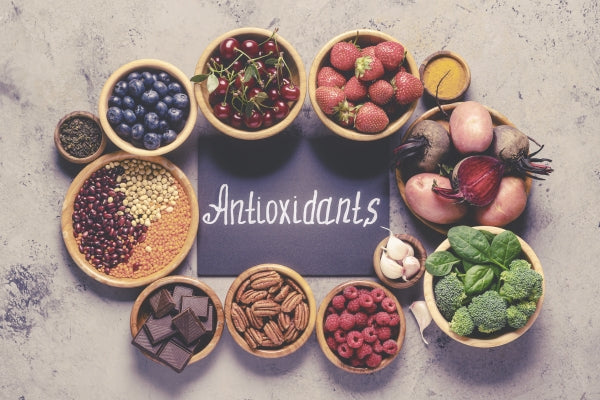

Antioxidants are natural substances that play a crucial role in protecting the body from oxidative stress, which can lead to cellular damage and contribute to various diseases. This comprehensive guide will explore what antioxidants are, their functions, sources, health benefits, and more.
Antioxidants are molecules that neutralize free radicals—unstable and reactive molecules that can cause oxidative damage to cells. Free radicals are produced in the body as a byproduct of normal metabolism, exposure to environmental toxins, and UV radiation. While the body can produce some antioxidants naturally, others must be obtained from the diet.
Antioxidants can be categorized into two main groups:
Endogenous Antioxidants: These are produced naturally by the body and include:
Exogenous Antioxidants: These are obtained from external sources, primarily from food. They include:
Antioxidants serve several essential functions in the body, including:
Neutralizing Free Radicals: By donating electrons to free radicals, antioxidants help stabilize them and prevent further cellular damage.
Protecting Cellular Structures: Antioxidants protect important cellular components, such as DNA, proteins, and lipids, from oxidative damage.
Supporting Immune Function: Antioxidants enhance the immune response and help the body fight infections and diseases.
Reducing Inflammation: Antioxidants can help lower inflammation levels in the body, which is associated with chronic diseases such as heart disease and cancer.
Promoting Healthy Aging: By combating oxidative stress, antioxidants may help slow the aging process and reduce the risk of age-related diseases.
Incorporating a variety of antioxidant-rich foods into your diet is an excellent way to support your body's defense against oxidative stress. Some of the best sources of antioxidants include:
Research suggests that a diet rich in antioxidants may provide several health benefits:
Reduced Risk of Chronic Diseases: Antioxidants can help lower the risk of chronic conditions such as heart disease, diabetes, and certain cancers by combating oxidative stress.
Enhanced Immune Function: Antioxidants support the immune system, helping the body fight infections and reduce the severity of illnesses.
Improved Eye Health: Antioxidants like lutein and zeaxanthin, found in leafy greens, may protect against age-related macular degeneration and cataracts.
Better Skin Health: Antioxidants protect the skin from UV damage and promote healthy aging by reducing wrinkles and fine lines.
Cognitive Protection: Certain antioxidants, such as vitamin E and flavonoids, may help protect brain health and reduce the risk of neurodegenerative diseases like Alzheimer’s.
While it is possible to obtain antioxidants through a balanced diet, many people consider supplements for additional support. However, it's essential to approach antioxidant supplementation with caution:
Whole Foods First: It's best to prioritize whole foods over supplements, as whole foods provide a complex matrix of nutrients and bioactive compounds that work synergistically.
Potential Risks: High doses of antioxidant supplements may have adverse effects and can interfere with certain medications. For example, excessive vitamin E supplementation may increase the risk of bleeding, and high doses of beta-carotene have been linked to an increased risk of lung cancer in smokers.
Consult a Healthcare Professional: Before starting any supplements, consult a healthcare provider to determine the right approach for your individual needs.
Several myths surround antioxidants that are important to address:
All Antioxidants Are Equal: Different antioxidants have unique properties and functions. For example, vitamin C is water-soluble and effective in different contexts than fat-soluble antioxidants like vitamin E.
More Is Always Better: Overconsumption of antioxidant supplements can lead to toxicity and negative health effects. A balanced diet is key.
Antioxidants Alone Prevent Disease: While antioxidants play a protective role, a holistic approach that includes a balanced diet, regular exercise, and a healthy lifestyle is essential for disease prevention.
Antioxidants Can Replace a Healthy Diet: No supplement can substitute for the health benefits of a balanced diet rich in whole foods.
Antioxidants are essential compounds that play a crucial role in protecting the body from oxidative stress and supporting overall health. By consuming a variety of antioxidant-rich foods, you can enhance your body's natural defenses and potentially reduce the risk of chronic diseases. Remember that a balanced diet, lifestyle, and consultation with healthcare professionals are vital for optimizing health. Embrace the power of antioxidants and make them a delicious part of your everyday meals!
Share:
Minerals: Everything you need to know
Heavy metals: Everything you need to know